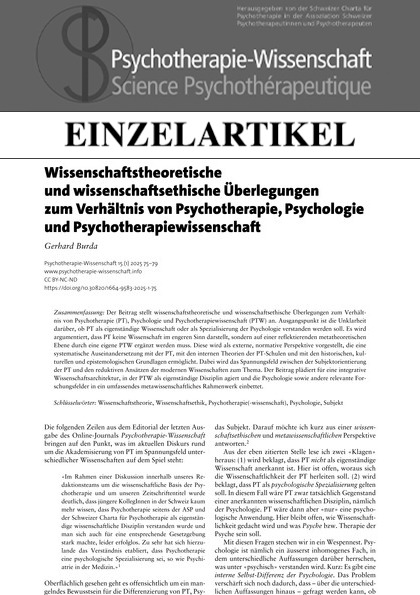Scientific-theoretical and scientific-ethical considerations on the relationship between psychotherapy, psychology and psychotherapy science
DOI:
https://doi.org/10.30820/1664-9583-2025-1-75Keywords:
philosophy of science, ethics of science, psychotherapy (science), psychology, subjectAbstract
This article presents theoretical and ethical considerations on the relationship between psychotherapy (PT), psychology and psychotherapy science (PTW). The starting point is the lack of clarity as to whether PT should be understood as an independent science or as a specialization of psychology. It is argued that PT is not a science in the narrower sense, but must be supplemented on a reflective metatheoretical level by its own PTW. This is presented as an external, normative perspective that enables a systematic examination of PT, the internal theories of the PT schools and the historical, cultural and epistemological foundations. In doing so, the tension between the subject orientation of PT and the reductive approaches of modern science becomes a topic. The article argues for an integrative scientific architecture in which PTW acts as an independent discipline and embeds psychology and other relevant fields of research in a comprehensive meta-scientific framework.
Downloads
Published
2025-04-03
How to Cite
Burda, G. (2025). Scientific-theoretical and scientific-ethical considerations on the relationship between psychotherapy, psychology and psychotherapy science. Psychotherapie-Wissenschaft, 15(1), 75–79. https://doi.org/10.30820/1664-9583-2025-1-75
Issue
Section
Debatte
License
Copyright (c) 2025 Gerhard Burda

This work is licensed under a Creative Commons Attribution-NonCommercial-NoDerivatives 3.0 Unported License.
This journal provides open access to its content in accordance with the basic premise that the free public availability of research benefits the exchange of knowledge throughout the world.
Authors wishing to publish in this journal agree to the following:
- The author/s retain/s the copyrights and consent/s to initial publication of the work in the journal under a Creative Commons Attribution licence, which allows third parties to use the work by citing the name/s of the author/s and this journal as initial publisher (in accordance with the Creative Commons Attribution-NonCommercial-NoDerivs 3.0 DE-Licence).
- The author/s can enter into additional contracts for the non-exclusive distribution (e.g. publish in a collection or book) of the version published in the journal, if the journal is cited as initial publisher.


